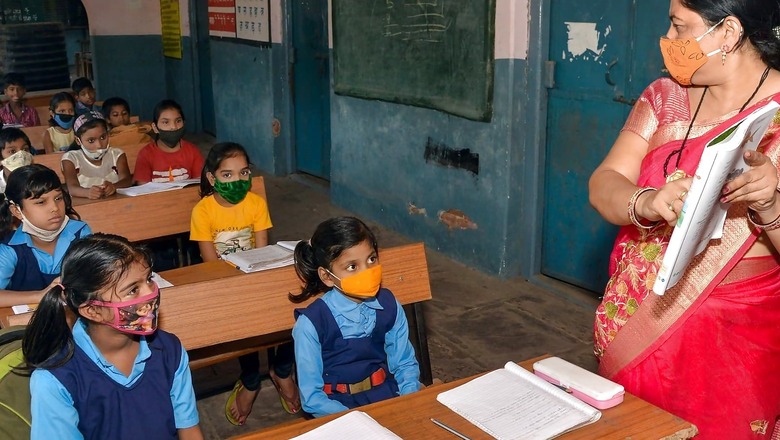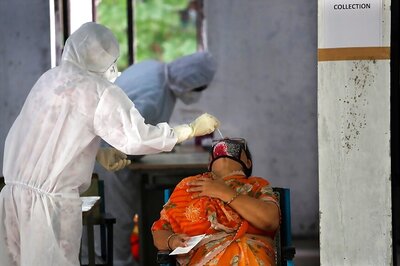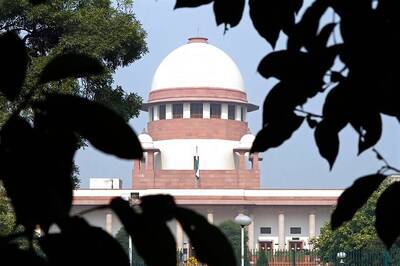
views
Since March 2020, the world has been in crisis and uncertainty. In such times, what does one do? There are some guiding principles one can use in such situations. The first is the principle of “do no harm”. We can try new steps in a new situation, even without evidence, but we must adhere to this guiding principle. The second is the principle of natural justice: we should prioritise the welfare of kids, especially in times of distress. Prioritising kids is instinct, common to not just humans but all mammals. Have we followed these principles in our Covid response?
“A few weeks to flatten the curve” is how it started. Schools were shut for kids. Children were not even allowed to play with one another. After all it was for the noble cause of “saving lives”. Over time, various governments have tried various methods to control Covid spread, including harsh lockdowns. But is there scientific evidence that various restrictions on kids have had effect? Specifically, is there evidence that school closure is beneficial? Have we adhered to “do no harm to kids” in the last two years?
Fear for Kids, and a Common Myth
Unfortunately, fear rather than reason has been the basis for much of the world’s Covid response. In the context of kids, there are two kinds of fears. The first is the fear for kids: will Covid affect our children? This fear is natural, and was rational in the early period when we did not know much about Covid. But over a period of time we need to pause and ask: has Covid affected kids? Do we know in our circles of any child who has been affected severely by Covid? Such instances are very rare indeed.
Our own personal experience apart, several careful studies have shown the same conclusion. An analysis of nearly two million children in Sweden showed that no child died due to Covid. We must note that Sweden had its schools open for under-16 kids throughout, including peak pandemic. A more recent study of German kids too showed a similar result: no healthy child in the school age-group died due to Covid. In both the Swedish and German studies, even ICU admissions were very rare for kids. Covid risk for kids is in fact so miniscule that as per US data, it is even less than drowning accidents. Do we spend every day of our life worrying about kids drowning? So is fear for kids being affected by Covid reasonable?
A common myth in this context is that we have somehow protected kids from the virus by shutting schools. However, various sero-surveys shatter this myth. Kids in India have been exposed as much as adults: as high as 75 per cent as of June 2021, likely to be near 100 per cent now after Omicron. It is just that we did not even notice it, since kids’ bodies have had no problem fighting the virus.
Harms Due to Unreasonable Fear
However, fear for kids remains at unreasonable levels, even in places where we usually find reason. For instance, a US Supreme Court judge recently remarked during a hearing that there were over 100,000 kids in the US in serious condition due to Covid. However she was way off the mark: at that time just about 3,300 kids in the US were in hospital with Covid; even here many of the kids were in hospital for some other reason (e.g. a broken leg or appendicitis) and happened to test positive, and were not hospitalized due to Covid. So the judge was off by a factor of more than 30. What effect does this level of overblown fear have?
An analysis of US’s CDC data shows that in the year 2020, there was a staggering increase of about 14 per cent in deaths in the 15-19 age-group, not due to Covid, but due to various draconian restrictions on kids’ lives. Not learning from this extreme harm, roll forward another 10 months, the American Academy of Pediatrics had to declare a national emergency in child and adolescent mental health. Worldwide, kids’ education has suffered the worst since World War-2. As of September 2020, UNICEF estimated that 24 million children will never return to school. In India, 260 million children face an education emergency due to 700 days of school closure, the longest on the planet, surpassing 200+ other countries.
In this context, the statement “जान है तो जहान है” (life is more valuable than anything else) is not just banal, it is a cruel twist. Kids are clearly not in danger from Covid, but are suffering extreme harms due to school closures and other restrictions. Not only is the mental health of kids in tatters, but their future is destroyed due to school closure. The link between illiteracy and poverty is well known, as is the link of both with healthcare. It is especially known that literacy of girls is extremely important for the health of the subsequent generation. Therefore, school closures, with the ostensible aim to “protect kids”, is achieving the exact opposite: of causing immense harm to today’s kids as well as their next generation.
Fear of Kids
A second element of fear and anxiety in Covid times is fear of kids. Consider this: recently, a mother in Texas (USA) placed her 13-year-old son in the trunk of her car, to “avoid being exposed” after her son tested positive. Is this level of fear of kids acceptable? We cannot write-off the mother as a “bad-apple”, as the episode turned for the worse: the concerned judge found “no reason to charge” the mother. How is this justifiable?
In many parts of the world, including India, kids’ playgrounds have been closed; many housing societies have placed arbitrary rules against children playing. Even where governments have been willing to open schools, teacher’s unions have lobbied against the same. At one point, innocent children were even blamed for the death of old people. Is this ethical? What about children’s well-being, their right to a normal and enjoyable childhood? This is society devouring its young, consumed by fear of Covid. Is this even human?
What makes the fear of kids even more unethical is that such fear is not even backed by evidence. In fact there is overwhelming evidence that schools are not super-spreaders, that there is no increased risk for teachers compared to other professions. Furthermore, some studies even show that adults who live with kids face a lower mortality risk.
Start Schools, Stop the Harm
There is thus an urgent need to put an end to the harm being done to kids in the name of Covid response. It is not that Covid has disappeared. It never will. But all aspects of life cannot be centered around avoidance of a respiratory virus. Importantly, crucial aspects of kids’ lives cannot be centered around avoidance of a virus which does not affect them. To this end, we must immediately start schools and all related activities such as sports, music, arts, etc. for kids. All-round education is essential for the physical and mental well-being of our kids. This necessarily means that we must stop disruptive social distancing for kids. Such distancing is all harm and no benefit for the kids. All kids deserve a normal childhood, like all of us adults of today enjoyed as kids.
When it comes to schools, we must specifically also stop asymptomatic testing for kids. Such testing too has no benefit for kids, and has irrational element of fear of kids, and increases anxiety. Thankfully ICMR’s recently announced testing policy already addresses this concern. Now the onus is on local health bodies to actually implement this policy.
And finally, schools must be delinked from Covid jabs for kids. The current jabs are still under trial and its long-term effects unknown. The NTAGI (National Technical Advisory Group on Immunisation) clearly said in late December 2021 that there is no need for Covid jabs for Indian kids. Surely, the scientific evidence could not have changed within a few days to pursue the exact opposite of this recommendation. After all, haven’t the majority of Indian kids already encountered and fought off the virus successfully anyway?
To rally people around these goals, a group of us have started an initiative “Happy 2022, Happy for Kids Too”, endorsed by eminent epidemiologists, pediatricians, other doctors, educationists and lawyers. We invite one and all to join the Chain-for-Children’s-Cheer at happy22kids.org. Let us start living for kids; it would be therapeutic after having lived in fear and anxiety for nearly two years.
Bhaskaran Raman is a Professor at IIT Bombay. The views expressed in this article are those of the author and do not represent the stand of this publication.
Read all the Latest Opinions here



















Comments
0 comment